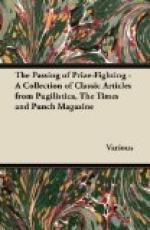General (aside). There doth
seem to be
More than politeness
in these invitations.
(To Colonel)
I am no cook to judge by sight and touch
The flavour of
a dish. Issue the dinners
To all the rank
and file, that so my pleasure
In marking their
expressions of content
Be equal to the
praise I shall bestow.
Voice within. Help! help! The cooks have fainted in the stew.
Adjutant. They’ll not be noticed.
Colonel.
Now hath fortune proved
My master. I’ll not live a slave
to Chance.
[Eats some of the stew and dies.
General. Conscience hath claimed
her toll and is content.
We’ll go inspect another regiment.
CURTAIN.
* * * * *
A member of the Chancery Bar consults us on the following point: “I was awakened,” he says, “by my dog during a recent air-raid. He was so annoyed that he consumed the whole of Lewin on Trusts and commenced Tudor on Wills, and is now suffering from severe indigestion. Have I or has the dog any equitable remedy?”
* * * * *
[Illustration: TERRORS OF THE SCOTTISH LANGUAGE.
Housemaid in Glasgow Hotel. “YE CANNA GANG TO THE BATHROOM THE NOO.”
Sassenach. “WHY NOT?”
Housemaid. “THERE’S A BODY IN THE BATH.”]
* * * * *
THE NEW MRS. MARKHAM.
IV.
CONVERSATION ON CHAPTER LXXI.
Mary. You spoke, Mamma, of CHAUCER being the Father of English poetry. Was there any English poetry before the discoveries of Lord EDWARD MARSH?
Mrs. M. Certainly, my dear. CHAUCER was our first eminent poet, but, as a distinguished American critic has observed, he could not spell. This greatly interfered with his popularity. Then there was SHAKSPEARE, who wrote quaint old-fashioned plays quite unsuitable for filming, but nevertheless enjoyed a certain fame until it was proved that he never existed and that SHAKESPEARE was the name of a syndicate; or that if he did exist he was somebody else; when all interest in his work naturally evaporated. The abolition of rhyme, about the year 1920, gave a fresh impetus to English poetry, and now, as you know, almost anyone can write it fluently, whereas formerly the easiest poems were written with the greatest difficulty. Indeed one reads of some old poets who were not able to produce a mere hundred lines in a day. Under the “free-verse” system, some of the Palustrine (or Marshy) School have been known to produce as many as three thousand lines in a day and to earn in a week as much as MILTON, an old poet of the seventeenth century, received for the whole of his greatest work, on which he was engaged for years.




